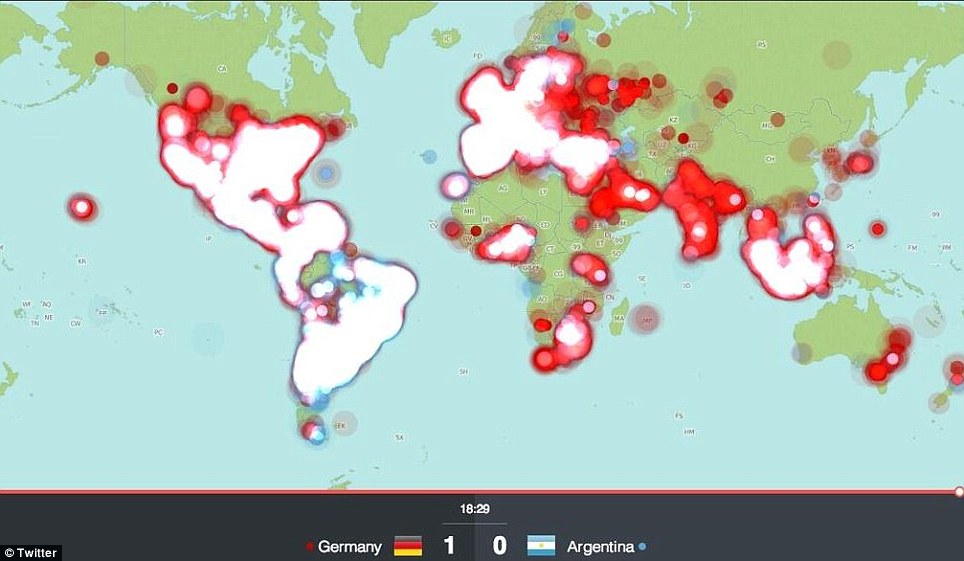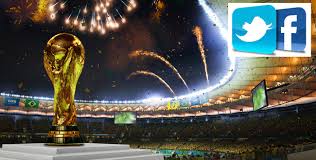By Ben Nicholson
July 15 – The 2014 World Cup has set new records for both Twitter and Facebook, becoming the most talked about sporting event in history on social media and living up to its pre-tournament moniker of being ‘The Mobile World Cup’.
At one point during the final there were 618,725 tweets per minute. This beat the record set during the Brazil v Germany game, and this, in turn, beat the previous record set by the 2013 Super Bowl.
Though the tweets per minute record was broken, the final fell short of the amount of tweets total record sent during the course of the game. That honor remains with the infamous Brazil v Germany game, which had a 3.5 million margin over the final with 35.6 million tweets in total. Twitter announced that over the course of the past month 672 million tweets were dedicated to the tournament.
Twitter released a heat map displaying the activity during the final, and the globe looks worryingly alight in it thanks to the volume of Twitter users exercising their thumbs.

A particular highlight that has proven popular with the Twitter populace is a ‘selfie’ taken by Lukas Podolski, in which Bastian Schweinsteiger obliges him with a kiss on the cheek. The photo was retweeted 88,620 times and earned 78,169 favourites. Angela Merkel will feel aggrieved for only managing a comparatively diminutive 25,022 retweets in Podolski’s “Selfie 2”, where he was pictured with the chancellor and the world cup trophy in tow. If she had puckered up perhaps she would have gone further.
Also feeling unloved through this medium could be Adidas, for their bitter rivals Nike received 3,072,369 mentions in comparison to their lesser 1,617,537.
These numbers have helped ease Twitter investors’ worries about the slow pace of user growth on the platform – an issue that has been accentuated since the company went public in November.
Facebook, though, have published even greater numbers. 88 million Facebook users provided 280 million interactions, which consist of likes, comments and posts, during the final game. This took the record from the 2013 Super Bowl’s hands where 245 million interactions were recorded.
Over the course of the tournament, Facebook has seen over 3 billion interactions from 350 million willing participants. The US contributed most to the cause, followed by Brazil, Argentina, Germany and Indonesia in turn.
Argentina was the most talked about team throughout the tournament, and the ages of the people most likely to do the saying was between 18 and 24.
Whilst the numbers speak in favour of Facebook’s performance over Twitter during the World Cup (largely due to the fact that Facebook has about 5 times as many users than Twitter), Twitter has secured it’s place as the ‘Real Time’ tracker of events and happenings. Facebook is slow to react on live news – stories don’t start trending on Facebook until generally they have broken elsewhere.
On Twitter, however, the reaction is instantaneous and information spreads faster (fizzling out before Facebook has even clocked it). The algorithms and editors of Facebook do not keep pace with the topics that trend through tweets and retweets on Twitter. Twitter is the go-to platform to engage in conversation during the game, whilst Facebook is more of an information outlet for learning the result and sharing opinion after the game is over.
This is perhaps exemplified by the fact that Mario Goetze was the most talked about player on Twitter, whilst Lionel Messi received more attention on Facebook during the final.
The fertile ground of social media has brought with it the gleaming eyes of advertisers. Nike, in particular, has gone to great lengths to dominate the talk by releasing three #RiskEverything films: ‘Risk Everything’, ‘Winner Stays’ and ‘The Last Game’. The three, in total, racked up 397 million views. “The Last Game” video entered into historic Facebook lists as it became one of the most shared posts ever, with 23 million people doing its bidding.
Another successful campaign was to create an animated version of Zlatan Ibrahimovic, speaking in an authoritative third person, who provided commentary on the tournament’s proceedings, and gathering 22 million views and 12 million consumer engagements.
Nike Football discovered 6.2 million new followers across various social platforms, which they hope to enlarge by releasing their Nike Football app. This gives users access to latest news events and facilitates the organisation of local pick-up games through their phones.
Nike have been quick to point out that they have received twice as many views of their content than Adidas has of theirs, whilst releasing 20% less content than their foe.
Contact the writer of this story at moc.l1741043951labto1741043951ofdlr1741043951owedi1741043951sni@n1741043951osloh1741043951cin.n1741043951eb1741043951

